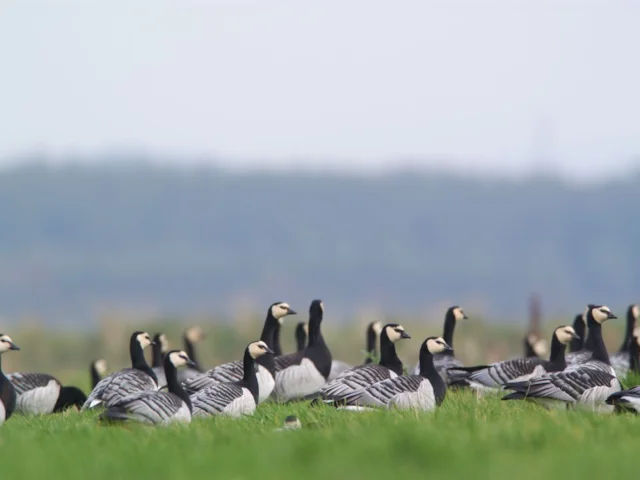Oldest Barnacle Goose has flown "five times round the world"
4335945e-8182-4707-9b09-11be657438ce

The oldest Barnacle Goose ever recorded has returned to Caerlaverock WWT, having flown well over 120,000 miles.
Observers at the reserve on the Solway Coast spotted the bird this week. During its 30 years it will have flown the equivalent of five times the circumference of the Earth, while migrating to and from its Arctic breeding grounds. The WWT recorded the Barnacle Goose which wears an orange ring marked 'ANS', which turned out to have originally have been caught as an adult on the birds’ breeding grounds in Svalbard in 1986, making it at least 30 years old.
Birds are caught using rocket propelled nets and fitted with coloured plastic leg rings engraved with characters that allow them to be individually identified from a distance using a telescope.
The species, whose spectacular free-falling chicks featured in the opening episode of the recent David Attenborough series Life Story, is a regular winter visitor to the Solway Coast where it has been the subject of a research project since the 1950s. The Solway coast’s entire population of Barnacle Geese migrate to Svalbard in the Arctic to breed, making an annual round trip of 4,000 miles. This means that ANS has clocked up 120,000 miles in addition to for its daily flights to find food and roost.
WWT Caerlaverock Centre Manager Brian Morrell said: “It’s fantastic to see this old bird still going strong and making its incredible migration across the Norwegian Sea each year. The Barnacle Geese at Caerlaverock are one of conservation’s great success stories. Creating the WWT reserve has played a big part in bringing numbers up from a low of barely 300 back in the 1940s to over hundred times that today.
“Counting the geese and tracking individuals like ANS has provided critical information for helping them. Incredibly, in the [distant] past no one knew where the geese went in the summer and, as they were seen flying out to sea, it was assumed that they turned into barnacles, hence the name.”
Caerlaverock WWT is open every day from 10 am to 5 pm, except Christmas Day, providing an excellent opportunity to see the Barnacle Geese from the specially designed observatories, hides and towers.
Observers at the reserve on the Solway Coast spotted the bird this week. During its 30 years it will have flown the equivalent of five times the circumference of the Earth, while migrating to and from its Arctic breeding grounds. The WWT recorded the Barnacle Goose which wears an orange ring marked 'ANS', which turned out to have originally have been caught as an adult on the birds’ breeding grounds in Svalbard in 1986, making it at least 30 years old.
Birds are caught using rocket propelled nets and fitted with coloured plastic leg rings engraved with characters that allow them to be individually identified from a distance using a telescope.
The species, whose spectacular free-falling chicks featured in the opening episode of the recent David Attenborough series Life Story, is a regular winter visitor to the Solway Coast where it has been the subject of a research project since the 1950s. The Solway coast’s entire population of Barnacle Geese migrate to Svalbard in the Arctic to breed, making an annual round trip of 4,000 miles. This means that ANS has clocked up 120,000 miles in addition to for its daily flights to find food and roost.
WWT Caerlaverock Centre Manager Brian Morrell said: “It’s fantastic to see this old bird still going strong and making its incredible migration across the Norwegian Sea each year. The Barnacle Geese at Caerlaverock are one of conservation’s great success stories. Creating the WWT reserve has played a big part in bringing numbers up from a low of barely 300 back in the 1940s to over hundred times that today.
“Counting the geese and tracking individuals like ANS has provided critical information for helping them. Incredibly, in the [distant] past no one knew where the geese went in the summer and, as they were seen flying out to sea, it was assumed that they turned into barnacles, hence the name.”
Caerlaverock WWT is open every day from 10 am to 5 pm, except Christmas Day, providing an excellent opportunity to see the Barnacle Geese from the specially designed observatories, hides and towers.

